RCEP区域自贸区协议全文14TH'sAnnexIV
- 格式:pdf
- 大小:131.90 KB
- 文档页数:11

第三章附件二
最低信息要求
一、原产地证书
(一)出口商的名称及地址;
(二)生产商的名称及地址,如已知;
(三)进口商或收货人的名称及地址;
(四)货物描述及该货物的协调制度编码(六位数级别);
(五)原产地证书编号;
(六)适用的原产地标准;
(七)出口商或生产商的声明;
(八)签发机构以其授权签字和公章的方式,证明原产地证书所列货物符合第三章(原产地规则)所有相关要求;
(九)第二章第六条(关税差异)所指的RCEP原产国;
(十)确定交运货物的细节,例如发票号码、始发日期、船只名称或航空器航班号和卸货口岸;
(十一)对于适用区域价值成分原产地标准而言,离岸价格;
(十二)货物的数量;
(十三)对于背对背原产地证书而言,原始原产地证明的编号、签发日期、首次出口缔约方的RCEP原产国以及首次出口缔约方经核准出口商的授权码(如适用)。
二、原产地声明
(一)出口商的名称及地址;
(二)生产商的名称及地址,如已知;
(三)进口商或收货人的名称及地址;
(四)货物描述及该货物的协调制度编码(六位数级别);
(五)对于经核准出口商而言,出口商或生产商的授权码或识别码;
(六)唯一参考编号;
(七)原产地授予标准;(同上)
(八)授权签署者关于原产地声明所列货物符合第三章(原产地规则)所有相关要求的认证;
(九)第二章第六条(关税差异)所指的RCEP原产国;
(十)离岸价(FOB价值),如使用区域价值成分原产地(conferring)标准;
(十一)货物的数量;
(十二)对于背对背原产地声明而言,原始原产地证明编号、签发日期、首次出口缔约方的RCEP原产国以及首次出口缔约方经核准出口商的授权码(如适用)。
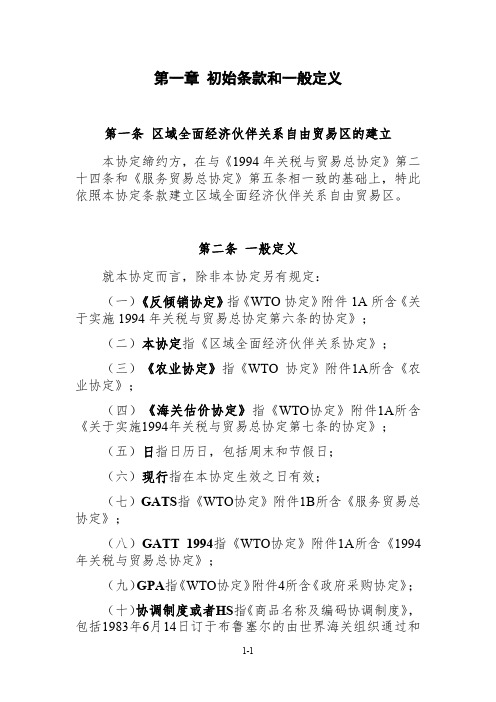
第一章初始条款和一般定义第一条区域全面经济伙伴关系自由贸易区的建立本协定缔约方,在与《1994年关税与贸易总协定》第二十四条和《服务贸易总协定》第五条相一致的基础上,特此依照本协定条款建立区域全面经济伙伴关系自由贸易区。
第二条一般定义就本协定而言,除非本协定另有规定:(一)《反倾销协定》指《WTO协定》附件1A所含《关于实施1994年关税与贸易总协定第六条的协定》;(二)本协定指《区域全面经济伙伴关系协定》;(三)《农业协定》指《WTO 协定》附件1A所含《农业协定》;(四)《海关估价协定》指《WTO协定》附件1A所含《关于实施1994年关税与贸易总协定第七条的协定》;(五)日指日历日,包括周末和节假日;(六)现行指在本协定生效之日有效;(七)GATS指《WTO协定》附件1B所含《服务贸易总协定》;(八)GATT 1994指《WTO协定》附件1A所含《1994年关税与贸易总协定》;(九)GPA指《WTO协定》附件4所含《政府采购协定》;(十)协调制度或者HS指《商品名称及编码协调制度》,包括1983年6月14日订于布鲁塞尔的由世界海关组织通过和管理的《商品名称及编码协调制度的国际公约》附件规定的归类总规则、类注释、章注释和子目注释,以及缔约方在各自法律框架内修订、采用和实施的归类总规则、类注释、章注释和子目注释;(十一)IMF指国际货币基金组织;(十二)《国际货币基金组织协定》指1944年7月22日订于布雷顿森林的《国际货币基金组织协定》;(十三)《进口许可程序协定》指《WTO协定》附件1A 所含《进口许可程序协定》;(十四)法人根据适用法律组建或组织的任何实体,无论是否以营利为目的,无论属私营所有还是政府所有,包括任何公司、信托、合伙企业、合资企业、独资企业、协会或类似组织;(十五)最不发达国家指联合国指定的、尚未从最不发达国家的类型中毕业的任何国家;(十六)最不发达国家缔约方指属于最不发达国家的任何缔约方;(十七)措施指一缔约方采取的任何措施,包括法律、法规、规定、程序、决定、行政行为或任何其他形式;(十八)缔约方指本协定对其生效的任何国家或单独关税区;(十九)易腐货物指由于其固有特性,特别是在缺乏适当的储藏条件下快速变质的货物;(二十)人指自然人或法人;(二十一)个人信息指与已识别的或可识别的个人相关的任何信息,包括数据;(二十二)《装运前检验协定》指《WTO协定》附件1A 所含《装运前检验协定》;(二十三)RCEP指区域全面经济伙伴关系;(二十四)RCEP联合委员会是指根据第十八章第二条(设立RCEP联合委员会)设立的区域全面经济伙伴关系联合委员会;(二十五)《保障措施协定》指《WTO协定》附件1A 所含《保障措施协定》;(二十六)《SCM协定》指《WTO协定》附件1A所含《补贴与反补贴措施协定》;(二十七)中小企业指任何小型和中型企业,包括任何微型企业,在适当情况下可由每一缔约方依照各自的法律、法规或国家政策进一步定义;(二十八)《SPS协定》指《WTO协定》附件1A所含《实施卫生与植物卫生措施协定》;(二十九)《TBT协定》指《WTO协定》附件1A所含《技术性贸易壁垒协定》;(三十)贸易管理文件是指一缔约方发布或控制的、必须由或为了进口商或出口商完成的、与货物进出口相关的表格;(三十一)《贸易便利化协定》指《WTO协定》附件1A所含《贸易便利化协定》;(三十二)《TRIPS协定》指《WTO协定》附件1C所含《与贸易有关的知识产权协定》;(三十三)《关于国际收支条款的谅解》指《WTO协定》附件1A所含《关于1994年关税与贸易总协定国际收支条款的谅解》;(三十四)WTO指世界贸易组织;以及(三十五)《WTO协定》指订于1994年4月15日的《马拉喀什建立世界贸易组织协定》。

rcep全文解读-回复问题:通过RCEP协议全文解读,了解该协议的主要内容、影响以及对全球贸易发展的意义。
[RCEP全文解读]1. 引言RCEP(区域全面经济伙伴关系协定)是亚太地区国家间达成的一项全面自贸协定。
于2020年11月15日正式签署,涵盖欧亚大陆、东南亚和大洋洲,包括东盟成员国以及中国、日本、韩国、澳大利亚和新西兰等15个国家。
本文将逐步解读RCEP协议的主要内容、影响以及对全球贸易发展的意义。
2. 协议内容RCEP协议包括市场准入、贸易便利化、知识产权保护、电子商务、服务贸易、投资等多个领域的规定。
其主要内容如下:2.1 市场准入RCEP协议将降低或取消参与国家间的关税和非关税贸易壁垒,开放市场准入。
协议规定,各参与国家将逐步降低关税,并促进贸易和投资自由化。
2.2 贸易便利化RCEP协议通过简化贸易手续、加强贸易便利化措施等,促进贸易流程的顺利进行。
同时,协议还鼓励电子贸易的发展,以提高跨境贸易的效率。
2.3 知识产权保护RCEP协议规定了对知识产权的保护措施,在保护创新和知识产权的基础上,促进技术转移和创新合作。
2.4 电子商务RCEP协议鼓励和促进电子商务发展,包括电子支付、数字认证和数据流动等领域。
它为电子商务提供了规则和框架,以促进数字化经济的发展。
2.5 服务贸易RCEP协议涵盖了多个服务领域,包括金融、科技、医疗等,鼓励服务贸易的自由化和便利化。
3. 影响3.1 促进地区贸易RCEP以其庞大的经济规模和市场潜力,将进一步促进亚太地区的贸易活动。
降低贸易壁垒和提供更大的市场准入,将为参与国家的出口创造更多机会,推动地区贸易的增长。
3.2 加强区域合作RCEP协议将加强参与国家间的合作和关系。
通过共同制定规则和提供贸易便利化措施,各国将更密切地协作,促进地区的经济一体化。
3.3 促进产业转型升级RCEP协议将鼓励技术转移和创新合作,为参与国家的产业转型升级提供更多机会。
尤其是在知识产权保护和电子商务等领域,将促进数字化经济的发展,推动参与国家的经济结构升级。

rcep协议内容
RCEP是指“区域全面经济伙伴关系协定”,是一个由亚洲十国以及澳大利亚、中国、日本、韩国、新西兰组成的自由贸易区协定。
该协定于2020年11月15日在越南签署,标志着亚太地区的经济一体
化迈出了更加坚实的一步。
RCEP协议内容包括:
1.贸易自由化:对于大部分商品和服务实现零关税和零壁垒贸易,促进贸易自由化和区域一体化。
2.投资自由化:鼓励和促进各方之间的投资自由化,降低投资壁垒。
3.知识产权保护:加强知识产权保护,打击知识产权侵权行为,促进知识产权合作。
4.服务贸易:对于服务贸易,包括金融、医疗、教育、旅游等领域,实现自由化和便利化。
5.竞争政策:强化反垄断和反不正当竞争法律法规,维护市场公平竞争。
6.电子商务:促进电子商务跨境贸易,加强互联网和数字经济领域的合作。
7.技术合作:鼓励技术创新和技术合作,促进技术转移和技术共享。
总的来说,RCEP协议致力于促进区域内的经济一体化和贸易自
由化,为参与国家的经济发展和全球经济增长注入了新的活力。
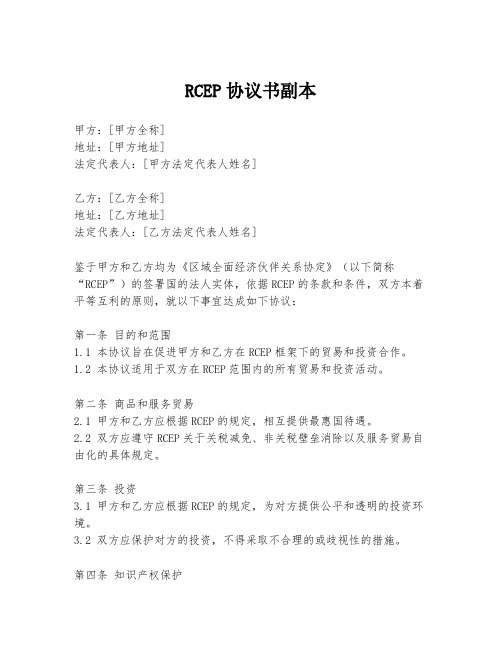
RCEP协议书副本甲方:[甲方全称]地址:[甲方地址]法定代表人:[甲方法定代表人姓名]乙方:[乙方全称]地址:[乙方地址]法定代表人:[乙方法定代表人姓名]鉴于甲方和乙方均为《区域全面经济伙伴关系协定》(以下简称“RCEP”)的签署国的法人实体,依据RCEP的条款和条件,双方本着平等互利的原则,就以下事宜达成如下协议:第一条目的和范围1.1 本协议旨在促进甲方和乙方在RCEP框架下的贸易和投资合作。
1.2 本协议适用于双方在RCEP范围内的所有贸易和投资活动。
第二条商品和服务贸易2.1 甲方和乙方应根据RCEP的规定,相互提供最惠国待遇。
2.2 双方应遵守RCEP关于关税减免、非关税壁垒消除以及服务贸易自由化的具体规定。
第三条投资3.1 甲方和乙方应根据RCEP的规定,为对方提供公平和透明的投资环境。
3.2 双方应保护对方的投资,不得采取不合理的或歧视性的措施。
第四条知识产权保护4.1 甲方和乙方应根据RCEP的规定,加强知识产权的保护和执法。
4.2 双方应遵守RCEP关于知识产权的保护标准,包括但不限于专利、商标、版权等。
第五条争端解决5.1 如双方在履行本协议过程中发生争端,应首先通过友好协商解决。
5.2 如果协商未能解决争端,双方同意将争端提交至RCEP争端解决机制。
第六条法律适用和解释6.1 本协议的解释、适用及争议的解决均应遵守RCEP的规定及相关国际法原则。
6.2 本协议的任何条款如与RCEP的规定不一致,应以RCEP的规定为准。
第七条协议的修改和终止7.1 本协议的任何修改和补充均应以书面形式作出,并经双方授权代表签字后生效。
7.2 除非双方另有书面约定,任何一方均可在提前[具体天数]天书面通知对方后终止本协议。
第八条其他8.1 本协议未尽事宜,双方可另行协商解决。
8.2 本协议一式两份,甲乙双方各执一份,具有同等法律效力。
甲方代表签字:__________乙方代表签字:__________签订日期:[签订日期](本协议书副本到此结束,以下无正文)。

中日韩自贸区协议协议名称:中日韩自贸区协议一、前言本协议旨在建立中日韩三国之间的自由贸易区,促进经济合作与发展,加强区域间的经济联系和合作。
二、目标与原则1. 目标:本协议的目标是促进中日韩三国之间的贸易自由化和投资便利化,推动贸易和投资的自由化、便利化和便利化,促进经济发展和互利共赢。
2. 原则:本协议的原则包括公平、公正、互利、互惠、透明、非歧视等。
三、市场准入与贸易自由化1. 关税减让:中日韩三国将逐步降低关税,包括但不限于工业品、农产品、服务等领域,以促进贸易自由化。
2. 非关税壁垒:中日韩三国将努力消除非关税壁垒,包括但不限于贸易限制、技术壁垒、贸易救济等,为企业提供公平竞争环境。
3. 贸易便利化:中日韩三国将简化贸易程序,提高通关效率,促进贸易便利化。
4. 服务贸易:中日韩三国将扩大服务贸易领域的开放,包括但不限于金融、教育、旅游等领域。
四、投资便利化与合作1. 投资自由化:中日韩三国将互相开放投资市场,提供公平、公正的投资环境,鼓励和保护投资。
2. 投资保护:中日韩三国将建立投资保护机制,保护投资者的合法权益,降低投资风险。
3. 技术合作:中日韩三国将加强技术合作,包括但不限于知识产权保护、技术转让等领域,促进创新和技术进步。
4. 产业合作:中日韩三国将加强产业合作,推动产业链的深度融合和优化,提高产业竞争力。
五、经济合作与发展1. 区域经济合作:中日韩三国将加强区域经济合作,推动经济一体化,促进共同繁荣。
2. 人文交流:中日韩三国将加强人文交流,包括但不限于教育、文化、旅游等领域,增进相互了解和友谊。
3. 环境保护:中日韩三国将加强环境保护合作,推动可持续发展,共同应对气候变化和环境问题。
六、机制与监督1. 机制建立:中日韩三国将建立协调机制,包括但不限于高级别会议、工作组等,推动协议的实施和落实。
2. 监督与评估:中日韩三国将建立监督与评估机制,定期评估协议的执行情况,及时解决问题和改进措施。

第十章投资第一条定义就本章而言:(一)涵盖投资指,对于一缔约方而言,在本协定生效之日,已在该方领土内存在的另一缔约方投资者的投资,或已被东道国所接受12,并遵循其相关法律、法规和政策(如适用)所设立、获取或扩大的投资;3(二)可自由使用货币指国际货币基金组织(IMF)在《国际货币基金组织协定》及其可能的修订所确定的可自由使用货币;(三)投资指一个投资者直接或间接,拥有或控制的,具有投资特征的各种资产,此类特征包括承诺资本或其他资源的投入、收益或利润的期待或风险的承担。
投资可以采取的形式包括:1. 法人中的股份、股票和其他形式的参股,包括由此派生的权利;2. 法人的债券、无担保债券、贷款4及其他债务工具以及由此派生的权利;51就马来西亚和泰国而言,本章规定的保护在适用的情况下,应当适用于经各自主管机关依照其各自的法律、法规和政策以书面方式明确批准保护的涵盖投资。
2就柬埔寨、印度尼西亚和越南而言,“已接受”是指“视情况而定,已经个案登记或书面批准”。
3就本定义而言,“政策”是指由一方政府以书面形式认可和宣布并以书面形式向公众提供的影响投资的政策。
4一缔约方向另一缔约方发行的贷款不是投资。
5一些形式的债务,如债券、无担保债券和长期票据,更可能具有投资的特征,而其他形式的债务,如因销售货物或服务而立即到期的付款请求权,则较不可能具有投资的特征。
3. 合同项下的权利,包括交钥匙、建设、管理、生产或收入分享合同;4. 东道国法律和法规所认可的知识产权和商誉;5. 与业务相关且具有财务价值的金钱请求权或任何合同行为的给付请求权;66. 根据东道国法律法规或依合同授予的权利,如特许经营权、许可证、授权和许可,包括勘探和开采自然资源的权利;以及7. 动产、不动产及其他财产权利,如租赁、抵押、留臵或质押。
7“投资”不包括司法、行政行为或仲裁程序中的命令或裁决。
就本段中的投资定义而言,用于投资的投资回报应当被视为投资。
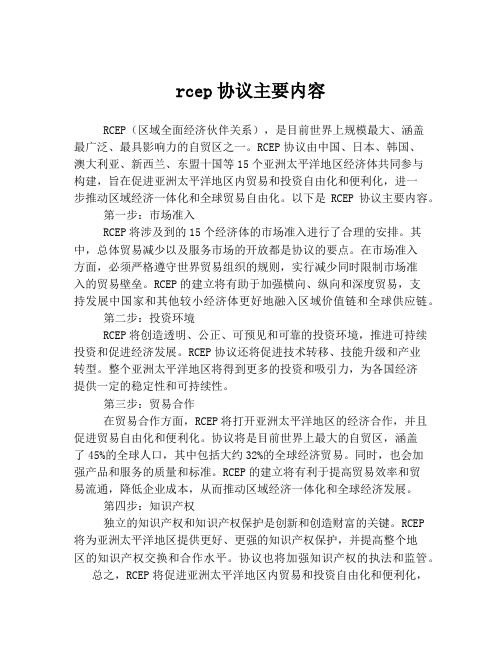
rcep协议主要内容RCEP(区域全面经济伙伴关系),是目前世界上规模最大、涵盖最广泛、最具影响力的自贸区之一。
RCEP协议由中国、日本、韩国、澳大利亚、新西兰、东盟十国等15个亚洲太平洋地区经济体共同参与构建,旨在促进亚洲太平洋地区内贸易和投资自由化和便利化,进一步推动区域经济一体化和全球贸易自由化。
以下是RCEP协议主要内容。
第一步:市场准入RCEP将涉及到的15个经济体的市场准入进行了合理的安排。
其中,总体贸易减少以及服务市场的开放都是协议的要点。
在市场准入方面,必须严格遵守世界贸易组织的规则,实行减少同时限制市场准入的贸易壁垒。
RCEP的建立将有助于加强横向、纵向和深度贸易,支持发展中国家和其他较小经济体更好地融入区域价值链和全球供应链。
第二步:投资环境RCEP将创造透明、公正、可预见和可靠的投资环境,推进可持续投资和促进经济发展。
RCEP协议还将促进技术转移、技能升级和产业转型。
整个亚洲太平洋地区将得到更多的投资和吸引力,为各国经济提供一定的稳定性和可持续性。
第三步:贸易合作在贸易合作方面,RCEP将打开亚洲太平洋地区的经济合作,并且促进贸易自由化和便利化。
协议将是目前世界上最大的自贸区,涵盖了45%的全球人口,其中包括大约32%的全球经济贸易。
同时,也会加强产品和服务的质量和标准。
RCEP的建立将有利于提高贸易效率和贸易流通,降低企业成本,从而推动区域经济一体化和全球经济发展。
第四步:知识产权独立的知识产权和知识产权保护是创新和创造财富的关键。
RCEP将为亚洲太平洋地区提供更好、更强的知识产权保护,并提高整个地区的知识产权交换和合作水平。
协议也将加强知识产权的执法和监管。
总之,RCEP将促进亚洲太平洋地区内贸易和投资自由化和便利化,建立透明、公正、可预见和可靠的投资环境,打开亚洲太平洋地区的经济合作,加强知识产权保护,推动区域经济一体化和全球贸易自由化。
这标志着全球经济多极化和区域化趋势的深化,这对大多数国家来说都是非常有益的。

第十五章经济技术合作第一条定义就本章而言,工作计划指缔约方依照第十五章第五条(工作计划)共同确定的经济技术合作活动清单。
第二条目标一、缔约方重申缔约方之间正在进行的经济技术合作倡议的重要性,并且同意在缔约方具有共同利益的领域补充现行的经济伙伴关系。
二、缔约方应当寻求优先考虑经济技术合作倡议,并且在可能的情况下,最大限度地减少正在进行的工作和资源使用的重复性,特别是在东盟成员国与其自由贸易伙伴签订的自由贸易协定项下。
三、缔约方同意,RCEP背景下的经济技术合作旨在缩小缔约方之间的发展差距,并从本协定的实施和利用中实现互惠的最大化。
经济技术合作应当考虑每一缔约方的不同发展水平和国家能力。
四、缔约方认可本协定各章中包含的鼓励和便利经济技术合作的条款。
第三条范围一、本章项下的经济技术合作应当通过工作计划中明确的与贸易或投资相关的经济技术合作活动,支持本协定包容、有效和高效的实施和使用。
二、缔约方应当探索并开展经济技术合作活动,包括侧重于下列内容的能力建设和技术援助:(一)货物贸易;(二)服务贸易;(三)投资;(四)知识产权;(五)电子商务;(六)竞争;(七)中小企业;以及(八)缔约方一致同意的其他事项。
第四条资源一、考虑到第十五章第二条(目标)所列出的目标,本章项下经济技术合作的资源应当自愿地并且以相关缔约方一致同意的方式提供。
二、在互惠基础上,缔约方可以考虑与以下方面合作或接受来自以下方面的帮助:(一)非缔约方;或者(二)次区域、区域或国际组织或机构,且该方有兴趣发展互惠合作和伙伴关系以支持工作计划的实施。
第五条工作计划一、依照第十五章第二条(目标)第四款的规定,缔约方应当考虑本协定中经济技术合作条款以及根据第十八章(机构条款)设立的委员会所确定的需求,制定工作计划。
二、为鼓励本协定的有效实施和使用,缔约方将在工作计划中优先考虑下列活动:(一)向发展中国家缔约方和最不发达国家缔约方提供能力建设和技术援助;(二)提高公众意识;(三)增加企业获取信息的途径;以及(四)缔约方可能一致同意的其他活动。
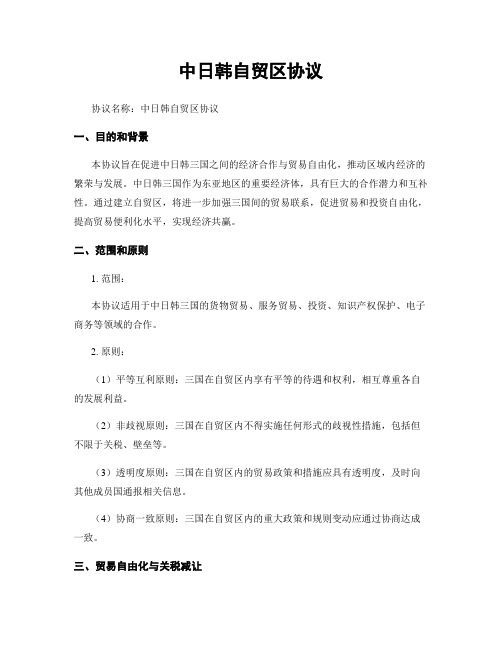
中日韩自贸区协议协议名称:中日韩自贸区协议一、目的和背景本协议旨在促进中日韩三国之间的经济合作与贸易自由化,推动区域内经济的繁荣与发展。
中日韩三国作为东亚地区的重要经济体,具有巨大的合作潜力和互补性。
通过建立自贸区,将进一步加强三国间的贸易联系,促进贸易和投资自由化,提高贸易便利化水平,实现经济共赢。
二、范围和原则1. 范围:本协议适用于中日韩三国的货物贸易、服务贸易、投资、知识产权保护、电子商务等领域的合作。
2. 原则:(1)平等互利原则:三国在自贸区内享有平等的待遇和权利,相互尊重各自的发展利益。
(2)非歧视原则:三国在自贸区内不得实施任何形式的歧视性措施,包括但不限于关税、壁垒等。
(3)透明度原则:三国在自贸区内的贸易政策和措施应具有透明度,及时向其他成员国通报相关信息。
(4)协商一致原则:三国在自贸区内的重大政策和规则变动应通过协商达成一致。
三、贸易自由化与关税减让1. 关税减让:(1)三国将逐步降低和取消自贸区内的关税,以促进贸易自由化。
(2)关税减让的具体措施和时间表将通过协商确定,并在协议附件中详细列明。
2. 非关税壁垒:(1)三国将致力于减少非关税壁垒,包括但不限于技术壁垒、标准壁垒、质量检验等。
(2)三国将加强合作,推动贸易便利化,提高通关效率。
四、投资自由化与便利化1. 投资促进:(1)三国将鼓励和保护自贸区内的投资,提供公平、公正和非歧视的待遇。
(2)三国将建立投资促进机制,为投资者提供便利和保护。
2. 投资自由化:(1)三国将逐步放宽和取消自贸区内的投资限制,提高投资自由化水平。
(2)三国将加强投资合作,推动投资便利化,提高投资环境。
五、知识产权保护与合作1. 知识产权保护:(1)三国将加强知识产权保护,依法打击知识产权侵权行为。
(2)三国将建立知识产权保护合作机制,加强信息共享和执法合作。
2. 知识产权合作:(1)三国将加强知识产权的合作与交流,推动技术创新和知识产权的转移与应用。
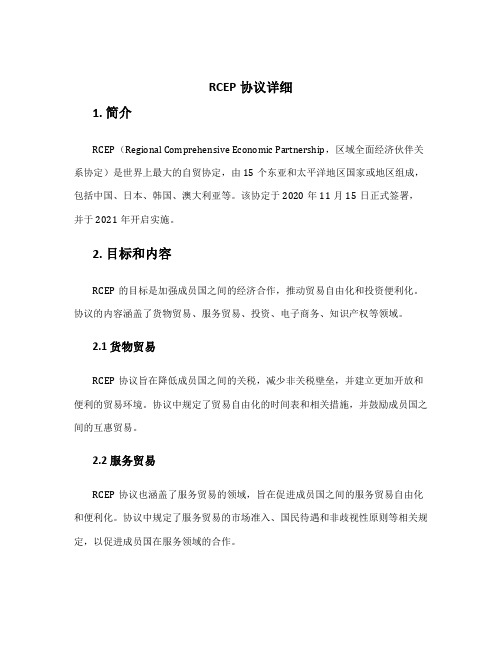
RCEP协议详细1. 简介RCEP(Regional Comprehensive Economic Partnership,区域全面经济伙伴关系协定)是世界上最大的自贸协定,由15个东亚和太平洋地区国家或地区组成,包括中国、日本、韩国、澳大利亚等。
该协定于2020年11月15日正式签署,并于2021年开启实施。
2. 目标和内容RCEP的目标是加强成员国之间的经济合作,推动贸易自由化和投资便利化。
协议的内容涵盖了货物贸易、服务贸易、投资、电子商务、知识产权等领域。
2.1 货物贸易RCEP协议旨在降低成员国之间的关税,减少非关税壁垒,并建立更加开放和便利的贸易环境。
协议中规定了贸易自由化的时间表和相关措施,并鼓励成员国之间的互惠贸易。
2.2 服务贸易RCEP协议也涵盖了服务贸易的领域,旨在促进成员国之间的服务贸易自由化和便利化。
协议中规定了服务贸易的市场准入、国民待遇和非歧视性原则等相关规定,以促进成员国在服务领域的合作。
2.3 投资RCEP协议的投资章节规定了成员国之间的投资合作和保护。
协议中包括了投资自由化、投资便利化、投资争端解决机制等内容,旨在吸引更多投资和提供更好的投资保护。
2.4 电子商务RCEP协议将电子商务列为重要领域之一,旨在促进电子商务的发展和合作。
协议中规定了电子商务的规则和原则,以及电子商务合作的机制。
2.5 知识产权RCEP协议对知识产权进行了保护和管理的规定。
协议鼓励成员国之间的合作,加强知识产权保护和执法,促进创新和知识产权的互利共享。
3. 影响和机遇RCEP协议的签署和实施对参与国家和地区带来了巨大的影响和机遇。
3.1 贸易增长RCEP协议将进一步降低贸易壁垒,促进贸易自由化和便利化。
这将促进成员国之间的贸易增长,提升整体经济发展水平。
3.2 投资增加RCEP协议的实施将吸引更多投资,包括外商直接投资和跨国公司的扩张。
这将带来更多的资金和技术,促进产业升级和经济发展。

第十四章中小企业第一条目标一、缔约方认识到,包括微型企业在内的中小企业为经济增长、就业和创新做出了重大贡献,为此缔约方寻求促进信息共享与合作,以提高中小企业利用并受益于本协定创造的机会的能力。
二、缔约方承认本协定多个章节中的条款有助于鼓励和便利中小企业参与本协定。
第二条信息共享一、每一缔约方应当促进与本协定相关的关于中小企业的信息共享,包括通过建立和维持一个可公开访问的信息平台,以及通过信息交流在缔约方之间共享知识、经验和最佳实践。
二、根据第一款可公开访问的信息包括:(一)本协定全文;(二)缔约方认为与中小企业有关的贸易和投资相关法律和法规的信息;以及(三)缔约方认为对有兴趣从本协定提供的机会中获益的中小企业有用的其他与商业相关的信息。
三、每一缔约方应当采取合理的步骤,以保证第二款所指的信息准确且为最新版本。
第三条合作一、缔约方应当加强本章项下的合作,可包括:(一)鼓励高效且有效地执行涉及便利性和透明度的贸易规章制度;(二)改善中小企业市场准入以及全球价值链参与度,包括促进和便利企业之间的合作关系;(三)促进中小企业使用电子商务;(四)探索缔约方创业计划经验交流的机会;(五)鼓励创新和使用技术;(六)提高中小企业对知识产权制度的认识、理解和有效使用;(七)推广良好的管理实践和有关制定有助于中小企业发展的法规、政策和计划方面的能力建设;以及(八)共享加强中小企业能力和竞争力的最佳实践。
第四条联络点每一缔约方应当在本协定对其生效之日起30天内指定一个或多个联络点,以便利本章项下的合作和信息共享,并将该一个联络点或多个联络点的联系细节向其他缔约方通报。
每一缔约方应当将此类联系细节的任何变动向其他缔约方通报。
第五条不适用争端解决本协定中的争端解决机制不得适用于本章项下产生的任何事项。

ANNEX IIISCHEDULE OF RESERVATIONS AND NON-CONFORMING MEASURES FORINVESTMENTTHE PHILIPPINESLIST AEXPLANATORY NOTES1. This List sets out, pursuant to Article 10.8 (Reservations and Non-ConformingMeasures), measures that do not conform to the obligations under:(a) Article 10.3 (National Treatment);(b) Article 10.4 (Most-Favoured-Nation Treatment);(c) Article 10.6 (Prohibition of Performance Requirements); and(d) Article 10.7 (Senior Management and Board of Directors).2. This List and List B follow the negative list with two list approach as follows:(a) This List sets out commitments in relation to existing non-conformingmeasures which will be subject to standstill obligations but not subject toratchet mechanism; and(b) List B sets out policy flexibility in relation to measures in sectors,subsectors and activities.3. The Philippines may add, withdraw or modify any of its reservations as set outin this List for a period of 24 months from the date of entry into force of this Schedule, provided that the non-conforming measure is in existence as of the date of entry into force of this Agreement. Any addition, withdrawal or modification in this List will be submitted to the Depositary who will notify the other Parties, including the relevant laws and regulations. Such reservation shall be deemed to form part of this Schedule upon such notification.4. Each reservation shall set out the following elements, where applicable:(a) Sector refers to the sectors in which a reservation is taken;(b) Subsector refers to specific industries, products, or activities in which areservation is taken;(c) Industry Classification refers to the activities covered by the reservationaccording to International Standard Industrial Classification (hereinafterreferred to as “ISIC”) Revision 3 for manufacturing, agriculture, fishery,forestry, mining and quarrying. If the reservation does not exactly conformto the ISIC, the Philippines specified the coverage of the reservation, asnecessary and appropriate;(d) Level of Government specifies the level of government maintaining themeasure for which a reservation is taken;(e) Type of Obligation refers to the obligation of National Treatment, Most-Favoured-Nation Treatment, Prohibition of Performance Requirements,and Senior Management and Board of Directors, as the case may be,which do not apply to the listed measure;(f) Description of Measure refers to measures that do not conform toNational Treatment, Most-Favoured-Nation Treatment, Prohibition ofPerformance Requirements, and Senior Management and Board ofDirectors for which a reservation is taken; and(g) Source of Measure refers to existing measures that apply to the sector,subsector or activities covered by the reservations and is identified fortransparency purposes only.5. In the interpretation of a reservation, all elements of a reservation shall beconsidered. The Description of Measure element shall prevail over all other elements.6. These Explanatory Notes shall form part of this List.1Sector : All sectorsSubsector : -Industry Classification : -Level of Government : All levelsType of Obligation : National Treatment (Article 10.3)Most-Favoured-Nation Treatment (Article 10.4)Prohibition of Performance Requirements (Article10.6)Senior Management and Board of Directors (Article10.7)Description of Measure : Establishment of Domestic Corporation(a) Number of incorporators shall be naturalpersons, not less than five but not more than15, all of legal age;(b) Majority of the incorporators and directors shallbe residents of the Philippines; and(c) Corporate Secretary shall be a citizen andresident of the Philippines.Participation of foreign investors in entitiesengaged in partially nationalized activities andpublic utilitiesFor public utility enterprises or corporationsengaging in partially nationalized activities, thePresident and all the executive and managingofficers of such corporation or association must becitizens of the Philippines. The participation offoreign investors in the governing body of saidenterprise shall be limited to their proportionateshare in its capital.Establishment of CooperativeNo foreign equity is allowed.Domestic and Export EnterpriseSmall and medium-sized domestic marketenterprises are reserved to Philippine nationals,however, the Philippines may allow up to amaximum of 40 percent foreign equity in small andmedium-sized domestic market enterprises,subject to compliance with requirements, terms andconditions.A non-Philippine national not otherwise disqualified by law may do business or invest in a domestic enterprise up to 100 percent of its capital, provided:(a) it is investing in a domestic market enterprise inareas outside the Foreign Investment Negative List under the Foreign Investments Act of 1991;or(b) it is investing in an export enterprise whoseproducts and services do not fall within Lists A and B of the Foreign Investment Negative List under the Foreign Investments Act of 1991.Provided, further, that, as required by existing laws, the country or state of the applicant must also allow Filipino citizens and corporations to do business therein.Note:“Philippine national” shall mean a citizen of the Philippines or a domestic partnership or association wholly owned by citizens of the Philippines; or a corporation organized under the laws of the Philippines of which at least sixty percent (60%) of the capital stock outstanding and entitled to vote is owned and held by citizens of the Philippines; or a corporation organized abroad and registered as doing business in the Philippines under the Corporation Code of which one hundred percent (100%) of the capital stock outstanding and entitled to vote is wholly owned by Filipinos or a trustee of funds for pension or other employee retirement or separation benefits, where the trustee is a Philippine national and at least sixty percent (60%) of the fund will accrue to the benefit of the Philippine nationals: Provided, that where a corporation and its non-Filipino stockholders own stocks in a Securities and Exchange Commission (SEC) registered enterprise, at least sixty percent (60%) of the capital stocks outstanding and entitled to vote of both corporations must be owned and held by citizens of the Philippines and at least sixty percent (60%) of the members of the Board of Directors of both corporations must be citizens of the Philippines, in order that the corporations shall be considered a Philippine national.Individuals or entities that do not meet the aforementioned qualifications are considered as “non-Philippine nationals”.23Sector : Fisheries and AquacultureSubsector : -Industry Classification : ISIC 050 Fishing, aquaculture and serviceactivities incidental to fishingLevel of Government : All levelsType of Obligation : National Treatment (Article 10.3)Most-Favoured-Nation Treatment (Article 10.4) Description of Measure : The use and exploitation of the fishery and aquaticresources in Philippine waters shall be reservedexclusively to Filipinos.Municipal FishingAll fishery activities in municipal waters shall beutilized by municipal fisherfolk and theircooperatives or organizations who are listed assuch in the registry of municipal fisherfolk.Commercial FishingNo commercial fishing vessel license shall beissued except to citizens of the Philippines,partnerships or to associations, cooperatives orcorporations duly registered in the Philippines atleast 60 percent of the capital stock1 of which isowned by Filipino citizens, subject to requirementsand compliance with certain conditions.Foreign owned vessels are not allowed to conductfishing operations in all Philippine waters.Note: There is a moratorium on the issuance ofcommercial fishing vessel and gear licenses andother clearances.FishpondNo fishpond lease agreements may be issued forpublic lands that may be declared available fordevelopment primarily except to citizens of thePhilippines, or fisherfolk cooperatives orassociations. In the absence of such citizens orfisherfolk cooperatives of associations,corporations duly incorporated in the Philippines atleast 60 percent of the capital stock of which isowned by Filipino citizens may be granted fishpond 1 The foreign equity participation under this Reservation is not covered by Reservation No. 1 of List B.2 The foreign equity participation under this Reservation is not covered by Reservation No. 1 of List B.43 The foreign equity participation under this Reservation is not covered by Reservation No. 10 of List B.5Sector : Mining and QuarryingSubsector : Small Scale MiningIndustry Classification : -Level of Government : All levelsType of Obligation : National Treatment (Article 10.3)Description of Measure : Small-scale mining is reserved to Filipino citizenswho, individually or in the company of other Filipinocitizens, voluntarily form a cooperative dulylicensed by the Philippine Government. Theprocessing of mineral ores and minerals theyproduced is reserved to Filipino citizens.Source of Measure : -The 1987 Philippine Constitution-R.A. No. 7942, the Philippine Mining Act of1995-R.A. No. 7076, the People’s Small-ScaleMining Act of 1991-R.A. No. 7586, the National IntegratedProtected Areas System of 1992-R.A. No. 7160, the Local Government Code of1991-Administrative Issuances6-R.A. No. 7183, An Act Regulating the Sale, Manufacture, Distribution and Use of Firecrackers and other Pyrotechnic Devices7Sector : ManufacturingSubsector : Atomic Energy FacilityIndustry Classification : ISIC Division 29 Manufacture of machinery andequipment n.e.c.Level of Government : All levelsType of Obligation : National Treatment (Article 10.3)Most-Favoured-Nation Treatment (Article 10.4)Prohibition of Performance Requirements (Article10.6)Description of Measure : No license to acquire, own, or operate any atomicenergy facility shall be issued to an alien, or anycorporation or other entity which is owned orcontrolled by an alien, a foreign corporation, or aforeign government, subject to compliancerequirements and terms and conditions. Acorporation or entity is not owned or controlled byan alien, a foreign corporation or a foreigngovernment if at least 60 percent of its capital stockis owned by Filipino citizens.Note:“Atomic energy facility”means any equipment ordevice which the Philippine Government maydetermine from time to time, by regulation, to becapable of producing or utilizing atomic energymaterial in such quantity or in such manner as to beof significance to the national interest or to thehealth and safety of the public.Source of Measure : -R.A. No. 5207, the Atomic Energy Regulatoryand Liability Act of 1968-Presidential Decree No. 1484, AmendingCertain Sections of Republic Act NumberedFifty Two Hundred and Seven Entitled "An ActProviding for the Licensing and Regulation ofAtomic Energy Facilities and Materials,Establishing the Rules on Liability for NuclearDamage, and for Other P urposes”8Sector : ManufacturingSubsector : Mass Media, Printing and PublishingIndustry Classification : ISIC Division 22Level of Government : All levelsType of Obligation : National Treatment (Article 10.3)Description of Measure : The ownership and management of mass mediashall be limited to citizens of the Philippines, or tocorporations or associations wholly owned andmanaged by such citizens.Note:“Mass Media”refers to the print medium ofcommunication, which includes all newspapers,periodicals, magazines, journals, and publicationsand all advertising therein, and billboards, neonsigns and the like, and the broadcast medium ofcommunication, which includes radio and televisionbroadcasting in all their aspects and all othercinematographic or radio promotions andadvertising.Source of Measure : -The 1987 Philippine Constitution-Presidential Decree No. 1018, Limiting theOwnership and Management of Mass Media toCitizens of the Philippines and for OtherPurposes-Presidential and Administrative Issuances9104 The foreign equity participation under this Reservation is not covered by Reservation No. 10 of List B.11Sector : All sectorsSubsector : -Industry Classification : -Level of Government : All levelsType of Obligation : Prohibition of Performance Requirements (Article10.6)Description of Measure : The adoption of a given rate or amount of royaltyunder a license contract is subject to approval,terms and conditions, and compliancerequirements imposed, by the relevant governmentagency under Philippine laws and regulations. Source of Measure : Administrative IssuancesLIST BEXPLANATORY NOTES1. This List sets out, pursuant to Article 10.8 (Reservations and Non-ConformingMeasures), measures that the Philippines may maintain existing, or adopt new or more restrictive measures that do not conform to the obligations under:(a) Article 10.3 (National Treatment);(b) Article 10.4 (Most-Favoured-Nation Treatment);(c) Article 10.6 (Prohibition of Performance Requirements); and(d) Article 10.7 (Senior Management and Board of Directors).2. This List and List A follow the negative list with two list approach as follows:(a) List A sets out commitments in relation to existing non-conformingmeasures which will be subject to standstill obligations but not subject toratchet mechanism; and(b) This List sets out policy flexibility in relation to measures in sectors,subsectors and activities.3. Each reservation shall set out the following elements, where applicable:(a) Sector refers to the sectors in which a reservation is taken;(b) Subsector refers to specific industries, products, or activities in which areservation is taken;(c) Industry Classification refers to the activities covered by the reservationaccording to International Standard Industrial Classification (hereinafterreferred to as “ISIC”) Revision 3 for manufacturing, agriculture, fishery,forestry, mining and quarrying. If the reservation does not exactly conformto the ISIC, the Philippines specified the coverage of the reservation, asnecessary and appropriate;(d) Level of Government specifies the level of government maintaining themeasure for which a reservation is taken;(e) Type of Obligation refers to the obligation of National Treatment, Most-Favoured-Nation Treatment, Prohibition of Performance Requirements,and Senior Management and Board of Directors, as the case may be,which do not apply to the listed measure;(f) Description of Measure refers to measures that do not conform toNational Treatment, Most-Favoured-Nation Treatment, Prohibition ofPerformance Requirements, and Senior Management and Board ofDirectors for which a reservation is taken; and(g) Source of Measure refers to existing measures that apply to the sector,subsector or activities covered by the reservations and is identified fortransparency purposes only.4. In the interpretation of a reservation, all elements of a reservation shall beconsidered. The Description of Measure element shall prevail over all other elements.5. These Explanatory Notes shall form part of this List.1235 Measures and mechanisms of local government units include general welfare, provision of basic services and facilities, generation of resources and creation of revenues within their respective territorial jurisdictions.6 These are systems, institutions, mechanisms, and technologies comprising a unique body of knowledge evolved through time that embody patterns of relationships between and among peoples and between peoples, their lands and resource environment, including such spheres of relationships which may include social, political, cultural, economic, religious spheres, and which are the direct outcome of the indigenous peoples, responses to certain needs consisting of adaptive mechanisms which have allowed indigenous peoples to survive and thrive within their given socio-cultural and biophysical conditions.47 Registration of a foreign investment (equity and debt) with the Bangko Sentral ng Pilipinas (BSP) is required if the foreign exchange needed to service the repatriation of capital and the remittance of dividends, profits and earnings which accrue thereon shall be sourced from authorized financial institutions.The approval and registration with BSP of a foreign loan is required if the foreign exchange needed to service the loan shall be sourced from authorized financial institutions, except in the following cases, which require BSP prior approval and registration regardless of source of foreign exchange for servicing: (a) public debt; and (b) private debt which are: (i) guaranteed by government corporations or government financial institutions, or by authorized financial institutions; or (ii) granted by local banks and directly funded or collateralized by offshore loans or deposits.58“Pioneer Enterprise” shall mean a registered enterprise (1) engaged in the manufacture, processing or production, and not merely in the assembly or packaging of goods, products, commodities or raw materials that have not been or are not being produced in the Philippines on a commercial scale or (2) which uses a design, formula, scheme, method, process or system of production or transformation of any element, substance or raw materials into another raw material or finished goods which is new and untried in the Philippines or (3) engaged in the pursuit of agricultural, forestry and mining activities and/or services including the industrial aspects of food processing whenever appropriate, pre-determined by the Board, in consultation with the appropriate Department, to be feasible and highly essential to the attainment of the national goal, in relation to a declared specific national food and agricultural program for self-sufficiency and other social benefits of the project or (4) which produces non-conventional fuels or manufactures equipment which utilize non-conventional sources of energy or uses or converts to coal or other non-conventional fuels or sources of energy in its production, manufacturing or processing operations. Provided, That the final product in any of the foregoing instances, involves or will involve substantial use and processing of domestic raw materials, whenever available; taking into account the risks and magnitude of investment: Provided, further, That the foregoing definitions shall not in any way limit the rights and incentives granted to less-developed-area enterprises.9 The registered enterprise under Executive Order No. 226 (the Omnibus Investments Code of 1987) shall obligate itself to attain the status of a Philippine national within 30 years from the date of registration or with such longer period as the Board may require taking into account the export potential of the project.610 For greater certainty, this right extends to any preferential treatment accorded pursuant to a subsequent review or amendment of the relevant bilateral or multilateral international agreement.78911 Illustrative Example: The Comprehensive Automotive Resurgence Strategy (CARS) Program under E.O. 182, to augment and enhance policy and directions of existing motor vehicle development programs towards ensuring a resurgent automotive industry that supports innovation, technology transfer, environmental protection, and small and medium enterprises development.101112Sector : All sectorsSubsector : -Industry Classification : -Level of Government : All levelsType of Obligation : National Treatment (Article 10.3)Most-Favoured-Nation Treatment (Article 10.4)Prohibition of Performance Requirements (Article10.6)Senior Management and Board of Directors (Article10.7)Description of Measure : The Philippines reserves the right to adopt ormaintain any measure or mechanism relating to:(a) investments other than those recognized orother than those that should have beenrecognized by the Philippine Governmentowing to the circumstances on the date ofentry into force of this Agreement; and(b) investments which were not technicallyfeasible on the date of entry into force of thisAgreement.Source of Measure : -13Sector : All sectorsSubsector : -Industry Classification : -Level of Government : All levelsType of Obligation : National Treatment (Article 10.3)Most-Favoured-Nation Treatment (Article 10.4)Prohibition of Performance Requirements (Article10.6)Senior Management and Board of Directors (Article10.7)Description of Measure : The Philippines reserves the right to adopt ormaintain any measure or mechanism that itconsiders necessary for the protection of itsessential security interests.Source of Measure : -14Sector : All sectorsSubsector : -Industry Classification : -Level of Government : All levelsType of Obligation : Prohibition of Performance Requirements (Article10.6)Description of Measure : The Philippines reserves the right to adopt ormaintain any measure or mechanism relating totechnology transfer, production processes, or otherproprietary knowledge.Source of Measure : -15Sector : All sectorsSubsector : -Industry Classification : -Level of Government : All levelsType of Obligation : National Treatment (Article 10.3)Most-Favoured-Nation Treatment (Article 10.4)Prohibition of Performance Requirements (Article10.6)Senior Management and Board of Directors (Article10.7)Description of Measure : The Philippines reserves the right to adopt ormaintain any measure relating to investments in allservices sectors and subsectors.Source of Measure : -16Sector : All sectorsSubsector : -Industry Classification : -Level of Government : All levelsType of Obligation : National Treatment (Article 10.3)Most-Favoured-Nation Treatment (Article 10.4)Prohibition of Performance Requirements (Article10.6)Senior Management and Board of Directors (Article10.7)Description of Measure : The Philippines reserves the right to adopt ormaintain any measure affecting or relating toelectronic commerce, where such measure isnecessary and would not constitute arbitrary orunjustifiable discrimination or a disguised restrictionon foreign investment.Source of Measure : -。
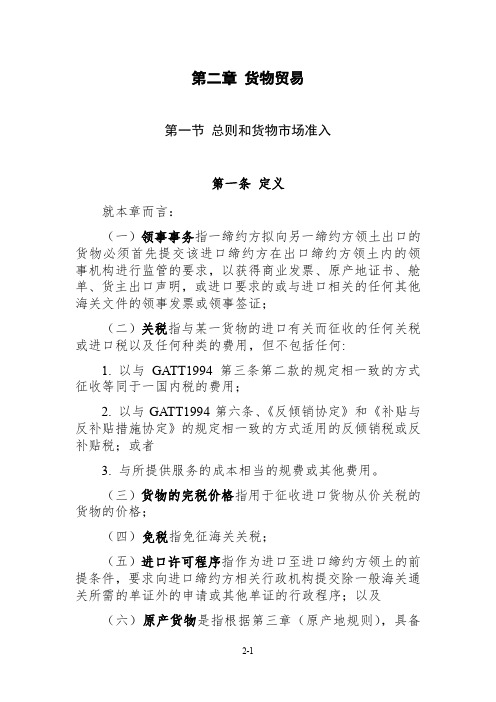
第二章货物贸易第一节总则和货物市场准入第一条定义就本章而言:(一)领事事务指一缔约方拟向另一缔约方领土出口的货物必须首先提交该进口缔约方在出口缔约方领土内的领事机构进行监管的要求,以获得商业发票、原产地证书、舱单、货主出口声明,或进口要求的或与进口相关的任何其他海关文件的领事发票或领事签证;(二)关税指与某一货物的进口有关而征收的任何关税或进口税以及任何种类的费用,但不包括任何:1. 以与GATT1994第三条第二款的规定相一致的方式征收等同于一国内税的费用;2. 以与GATT1994第六条、《反倾销协定》和《补贴与反补贴措施协定》的规定相一致的方式适用的反倾销税或反补贴税;或者3. 与所提供服务的成本相当的规费或其他费用。
(三)货物的完税价格指用于征收进口货物从价关税的货物的价格;(四)免税指免征海关关税;(五)进口许可程序指作为进口至进口缔约方领土的前提条件,要求向进口缔约方相关行政机构提交除一般海关通关所需的单证外的申请或其他单证的行政程序;以及(六)原产货物是指根据第三章(原产地规则),具备原产货物资格的货物。
第二条范围除本协定另有规定外,本章应当适用于缔约方之间的货物贸易。
第三条国内税和国内法规的国民待遇每一缔约方应当根据GATT1994第三条给予其他缔约方的货物国民待遇。
为此,GATT1994第三条经必要修改后应当纳入本协定,并且成为本协定的一部分。
第四条关税削减或取消一、除本协定另有规定,每一缔约方应当根据附件一(关税承诺表)中的承诺表削减或取消对其他缔约方原产货物的关税。
二、为进一步明确,根据《WTO协定》,如果一缔约方针对其他缔约方的原产货物所实施的最惠国关税税率低于该缔约方在附件一(关税承诺表)中承诺表规定的关税税率,其他缔约方的原产货物在进口时应当有资格适用该缔约方针对这些货物实施的最惠国关税税率。
在遵循其法律法规的情况下,每一缔约方应当规定,在进口商进口时未提出较低税率请求的情况下,该进口商可以申请退还为某一货物多缴纳的任何关税。
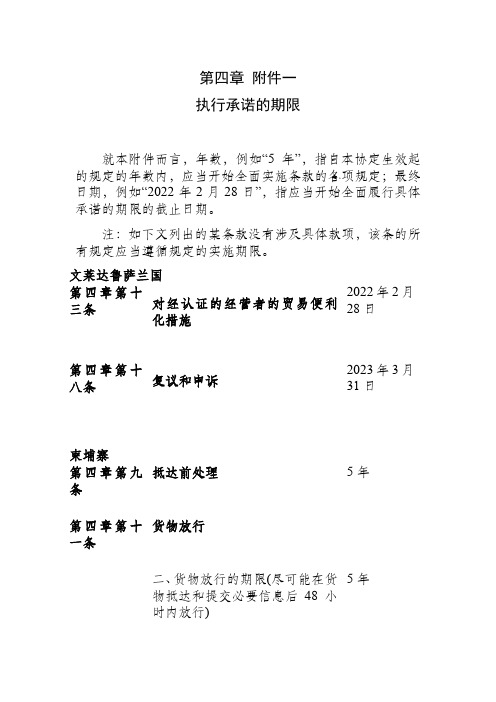
第四章附件一执行承诺的期限就本附件而言,年数,例如“5年”,指自本协定生效起的规定的年数内,应当开始全面实施条款的各项规定;最终日期,例如“2022年2月28日”,指应当开始全面履行具体承诺的期限的截止日期。
注:如下文列出的某条款没有涉及具体款项,该条的所有规定应当遵循规定的实施期限。
文莱达鲁萨兰国第四章第十三条对经认证的经营者的贸易便利化措施2022年2月28日第四章第十八条复议和申诉2023年3月31日柬埔寨第四章第九条抵达前处理5年第四章第十一条货物放行二、货物放行的期限(尽可能在货物抵达和提交必要信息后48小时内放行)5年六、易腐货物的放行(尽可能在6小时内放行)5年八、易腐货物的储存设施和程序5年第四章第十二条信息技术的应用二、使用信息技术,包括在货物运抵前提交数据,以及用于风险管理的电子或自动化系统5年四、以电子方式提交的贸易管理文件的法律等效性5年五、国际标准或方法5年六、在国际层面与其他缔约方的合作,以提升对以电子方式提交的贸易管理文件的接受度5年第四章第十三条对经认证的经营者的贸易便利化措施5年第四章第十五条快运货物一、快运货物程序的范围,包括:(一)抵达前处理5年(二)一次性提交信息5年(三)单证要求的最小化5年(四)快运货物的尽快放行,并在可能的情况下在6小时内放行5年(五)在快运货物的重量和海关5年估价方面适用第(一)项至第(四)项中的待遇第四章第十九条海关合作5年中国第四章第四条一致性5年印度尼西亚第四章第十条预裁决2022年2月28日第四章第十四条风险管理2022年2月28日老挝人民民主共和国第四章第十条预裁决二、申请人的法人代表或登记3年三、作出预裁决的程序3年七、预裁决的有效期5年八、通知申请人撤销、修改或废止预裁决的理由5年九、具有追溯效力的预裁决的撤5年销、修改或废止十、预裁决应当具有约束力5年十一、预裁决程序的公布3年十二、预裁决信息的公布3年第四章第十货物放行一条一、简化的海关程序的采用或维3年持二、货物放行的期限(尽可能在3年货物抵达和提交必要信息后48小时内放行)三、为进一步检验挑选货物3年四、在关税、国内税、规费及费3年用最终确定之前的货物放行五、检查、扣留、扣押或没收货3年物的权利六、易腐货物的放行(尽可能在5年6小时内放行)七、易腐货物在安排任何检验时3年的优先权八、易腐货物的储存设施和程序5年信息技术的应用第四章第十二条二、使用信息技术,包括在货物3年运抵前提交数据,以及用于风险管理的电子或自动化系统三、使贸易管理文件的电子版可公开获得3年四、以电子方式提交的贸易管理文件的法律等效性5年五、国际标准或方法5年六、在国际层面与其他缔约方的合作,以提升对以电子方式提交的贸易管理文件的接受度5年第四章第十三条对经认证的经营者的贸易便利化措施5年第四章第十四条风险管理一、采用或维持风险管理制度3年第四章第十五条快运货物一、快运货物程序的范围,包括:(一)抵达前处理3年(二)一次性提交信息5年(三)单证要求的最小化5年(四)快运货物的尽快放行,并在可能的情况下在6小时内放行5年(五)在快运货物的重量和海关估价方面适用第(一)项至第(四)项中的待遇5年(六)免于征收关税和国内税的微量货值或应纳税额的规定5年二、检验、扣留、扣押、没收或拒绝货物入境,或进行后续稽查的权利;要求提交补充信息和满足非自动许可要求的权利5年马来西亚第四章第十五条快运货物2022年2月28日缅甸第四章第四条一致性5年第四章第五条透明度5年第四章第六条咨询点2年第四章第七条海关程序5年第四章第九条抵达前处理5年第四章第十条预裁决一、预裁决的作出和预裁决的类型(与第(二)项相关)5年(原产地规则)二、申请人的法人代表或登记(与第一款第(二)项相关)5年(原产地规则)三、作出预裁决的程序(与第一款第(二)项相关)5年(原产地规则)四、作出预裁决的时间表(与第一款第(二)项相关)5年(原产地规则)五、将拒绝作出预裁决的决定通知申请人(与第一款第(二)项相关)5年(原产地规则)六、因未在规定的期限内提交补充信息,拒绝预裁决申请(与第一款第(二)项相关)5年(原产地规则)七、预裁决的有效期(与第一款第(二)项和第(三)项相关)5年(原产地规则和估价规则)八、通知申请人撤销、修改或废止预裁决的理由(与第一款第(一)项、第(二)项和第(三)5年(归类、原产地规则及项相关)估价规则)九、具有追溯效力的预裁决的撤销、修改或废止(与第一款第(一)项、第(二)项和第(三)项相关)5年(归类、原产地规则及估价规则)十、预裁决应当具有约束力(与第一款第(二)项相关)5年(原产地规则)十一、预裁决程序的公布(与第一款第(二)项相关)5年(原产地规则)十二、预裁决信息的公布(与第一款第(二)项相关)5年(原产地规则)第四章第十一条货物放行二、货物放行的期限(尽可能在货物抵达和提交必要信息后48小时内放行)5年三、为进一步检验挑选货物5年四、在关税、国内税、规费及费用最终确定之前的货物放行5年六、易腐货物的放行(尽可能在6小时内放行)5年第四章第十信息技术的应用5年二条第四章第十三条对经认证的经营者的贸易便利化措施5年第四章第十四条风险管理二、风险管理的设计和实施5年三、对高风险货物的集中海关监管和对低风险货物的快速放行。
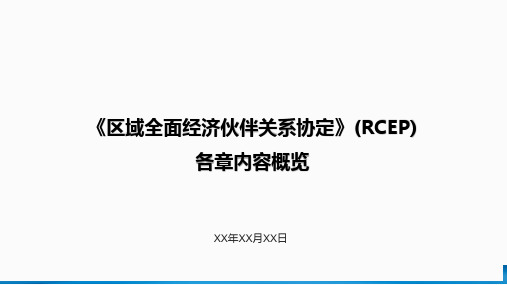

rcep协议具体内容RCEP(区域全面经济伙伴关系协定)是由东盟(ASEAN)十个成员国与中国、日本、韩国、澳大利亚、新西兰和印度共同发起的一项自贸协定。
该协定于2020年11月签署,涵盖了人口、贸易、投资、知识产权等领域,规定了双边贸易和投资的政策框架和流程,旨在促进亚太地区的贸易和合作,打造更具竞争力的地区市场。
一、协定的范围RCEP覆盖了世界人口53.2%、GDP32.2%和贸易总额29.5%的区域。
它涵盖了贸易自由化和投资便利化、协调贸易和服务、知识产权和电子商务等领域。
此外,还规定了一系列的规则和法律文件,包括平等互惠原则、贸易便利化、自由化、透明度和可预测性。
二、贸易自由化RCEP协定强调打破非关税壁垒,包括对商品的关税和非关税壁垒,为贸易自由化营造良好的环境。
同时,允许成员国根据自己的国情逐步减少关税,实现逐步自由化,充分考虑各个经济体特定的发展需要与制约因素,为贸易发展提出平衡要求。
三、投资便利化在投资方面,协定为参与者提供更广泛和更确切的投资保护,并制定规则以吸引和保留投资。
RCEP承认在区域内的所有成员国均享有充分的投资保护,规定成员国必须提供公正、公正和充分的保护,并允许受到损害的投资者根据来自GLS(国际仲裁中心)的新规则进行仲裁。
四、协调贸易和服务为了促进双方贸易和服务的协调,RCEP向成员国提供一个全面的市场准入清单。
此外,各成员国还将合作制定规则,管理跨境服务和现代化服务的其他领域,它涉及到贸易、金融、投资、建筑、公共工程和旅游等各个领域。
五、知识产权和电子商务该协定还规定了知识产权和电子商务方面的规则。
协议涵盖了相关贸易规则,如贸易鉴别、知识产权、商标、数据保护等,以及电子商务市场准入和股权限制等规定,旨在促进区域的数字经济发展。
六、环境与劳工保护为了促进可持续发展,RCEP还涉及环境和劳工保护的课题。
协议规定必须遵守国际环境和劳工标准,反对强制劳动和童工,同时,RCEP将合作开展环境与劳工保护相关培训和研讨活动。

ANNEX IVSCHEDULE OF SPECIFIC COMMITMENTS ONTEMPORARY MOVEMENT OF NATURAL PERSONSMALAYSIA1. The following sets out Malaysia’s commitments with respect to the temporary entry of naturalpersons of a Party into the territory of Malaysia in accordance with Chapter 9 (Temporary Movement of Natural Persons).2. A natural person of a Party seeking temporary entry into the territory of Malaysia under Chapter9 (Temporary Movement of Natural Persons) and this Schedule shall be required to obtain thenecessary visa and documentation prior to entry, and provide the requisite information and documentation in support of such application. Entry shall be granted subject to the terms, conditions, or limitations prescribed under Malaysia’s immigratio n laws and regulations.3. Malaysia remains unbound in respect of the supply of a service by a service supplier of a Partythrough the presence of natural persons of a Party in the territory of Malaysia, except as set out in this Schedule.4. For greater certainty, Malaysia remains unbound in respect of the supply of financial services bya service supplier of a Party through the presence of natural persons of a Party in the territory ofMalaysia except as stipulated otherwise in the Appendix to List B (Specific Commitments for Financial Services – Malaysia) read together with entry 43 in List B of Malaysia’s Schedule in Annex III (Schedules of Reservations and Non-Conforming Measures for Services and Investment).5. Malaysia’s commitments under Chapter 9 (Temporary Movement of Natural Persons) withrespect to the temporary entry of natural persons of a Party into the territory of Malaysia shall apply in relation to the categories of persons set out in the Horizontal Commitments below.6. In accordance with Article 9.5 (Schedules of Specific Commitments on Temporary Movement ofNatural Persons), for each category of natural persons set out in the Horizontal Commitments below, Malaysia specifies any terms, conditions, limitations, or qualifications that apply to the temporary entry of those natural persons into the territory of Malaysia.7. The Horizontal Commitments below shall apply to the sectoral commitments set out in theAppendix (Sectoral Specific Commitments) to this Schedule where indicated, and subject to any further terms, conditions, limitations, or qualifications stipulated in that Appendix.8. For the purposes of this Schedule:(a) “CPC”, where referenced, refers to the activity according to the Provisional Central ProductClassification (Statistical Papers Series M No. 77, Department of International Economicand Social Affairs, Statistical Office of the United Nations, New York, 1991). The use of “**”against individual CPC codes indicates that the specific commitment for that code does notextend to the total range of services covered under that code; and(b) “Unbound” means no commitment in the specified sector, subsector, or activity.9. The Schedules of other Parties shall not be used to interpret Malaysia’s commitments orobligations under Chapter 9 (Temporary Movement of Natural Persons) or other Chapters of this Agreement.HORIZONTAL COMMITMENTSAppendixSECTORAL SPECIFIC COMMITMENTSMALAYSIAA. SECTORS AND SUBSECTORS EXCEPT FINANCIAL SERVICES1 The NFP class licence enables the provision of niched or limited purpose network facilities such as radio communications transmitters for public mobile radio network services, radio communications transmitters for public radio paging network services, and radio communications transmitters and links for public wireless data network services, for the sole purpose of end users in buildings or a single clustered building complex.2 The NSP class licence enables the provision of niched customer access or niched connection services such as public mobile radio work services, one or two-way radio paging network services, radio communications transmitters for public radio paging network services, and radio communications transmitters and links for public wireless data network services, for the sole purpose of end users in buildings or a single clustered building complex.3 The ASP class licence enables the provision of application services such as audio text hosting services provided on an opt-in basis, directory services, and messaging services.B. FINANCIAL SERVICES1. The terms, conditions, limitations, or qualifications stipulated under the Horizontal Commitmentsshall not apply to financial services, including insurance, unless otherwise indicated in the commitments below.2. In respect of offshore banks, offshore investment banks, commercial banks, investment banks,offshore direct insurance companies, offshore reinsurance companies, offshore insurance brokers, offshore insurance underwriting managers, offshore insurance managers, direct insurance companies, reinsurance companies, and representative offices of commercial banks and investment banks, the terms, conditions, limitations, or qualifications stipulated in the Financial Services Horizontal Commitments shall apply in addition to the specific terms, conditions, limitations, or qualifications, as specified for each financial services activity.3. For greater certainty, Malaysia’s commitments below shall not be interpreted as applying to thesupply of Shariah-compliant financial services, unless specific entries are made in the banking, insurance, or capital markets subsectors accordingly. This approach is consistent with Malaysia’s commitments under the WTO and other existing Free Trade Agreements.4. For greater certainty, temporary entry of natural persons in respect of supply of service shall bethrough the mode of commercial presence of offshore banks, offshore investment banks, commercial banks, investment banks, offshore direct insurance companies, offshore reinsurance companies, offshore insurance brokers, offshore insurance underwriting managers, offshore insurance managers, direct insurance companies, reinsurance companies, and representative offices of commercial banks and investment banks, as provided in the Appendix to List B (Specific Commitments for Financial Services – Malaysia) read together with entry 43 in List B of Malaysia’s Schedule in Annex III (Schedules of Reservations and Non-Conforming Measures for Services and Investment).4For purposes of this Schedule, “non-banks” means any non-bank for scheduled businesses as referred to in Malaysia’s Schedule of Specific Commitments under GATS.。
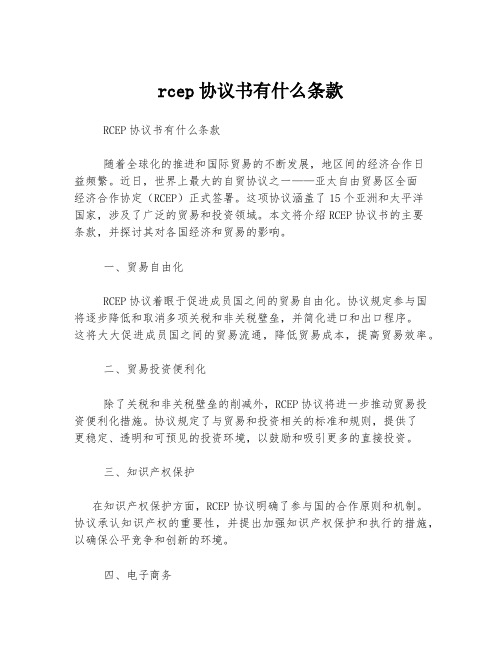
rcep协议书有什么条款RCEP协议书有什么条款随着全球化的推进和国际贸易的不断发展,地区间的经济合作日益频繁。
近日,世界上最大的自贸协议之一——亚太自由贸易区全面经济合作协定(RCEP)正式签署。
这项协议涵盖了15个亚洲和太平洋国家,涉及了广泛的贸易和投资领域。
本文将介绍RCEP协议书的主要条款,并探讨其对各国经济和贸易的影响。
一、贸易自由化RCEP协议着眼于促进成员国之间的贸易自由化。
协议规定参与国将逐步降低和取消多项关税和非关税壁垒,并简化进口和出口程序。
这将大大促进成员国之间的贸易流通,降低贸易成本,提高贸易效率。
二、贸易投资便利化除了关税和非关税壁垒的削减外,RCEP协议将进一步推动贸易投资便利化措施。
协议规定了与贸易和投资相关的标准和规则,提供了更稳定、透明和可预见的投资环境,以鼓励和吸引更多的直接投资。
三、知识产权保护在知识产权保护方面,RCEP协议明确了参与国的合作原则和机制。
协议承认知识产权的重要性,并提出加强知识产权保护和执行的措施,以确保公平竞争和创新的环境。
四、电子商务随着数字经济的蓬勃发展,电子商务在全球贸易中的地位日益重要。
RCEP协议也关注了电子商务的发展,并提出了相关的原则和规则,以促进参与国之间的电子商务合作与交流。
五、服务市场开放除了商品贸易,服务贸易也是RCEP协议的重要内容。
协议鼓励参与国进一步开放和促进服务市场的自由化,包括金融服务、教育服务、运输服务等,以推动成员国之间的服务贸易合作和互利共赢。
六、争端解决机制为保障协议的有效执行,RCEP协议还设立了争端解决机制。
该机制将作为成员国之间解决贸易争端的渠道,以便公正、公平地解决贸易纠纷,维护协议的权益。
总结:RCEP协议的签署对参与国的经济和贸易都将产生积极的影响。
首先,贸易自由化和投资便利化将加强成员国之间的经济联系,促进贸易和投资的自由流动。
其次,知识产权保护和电子商务的发展将推动创新和数字经济的进一步繁荣。